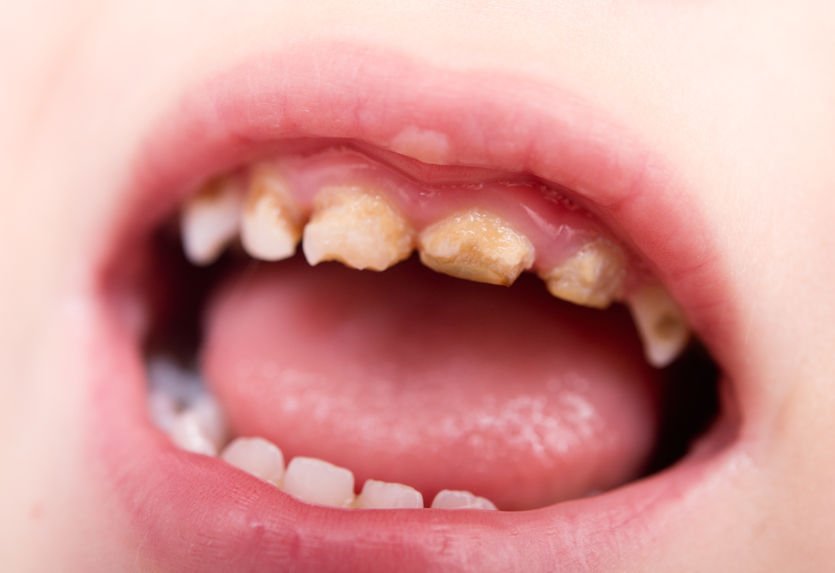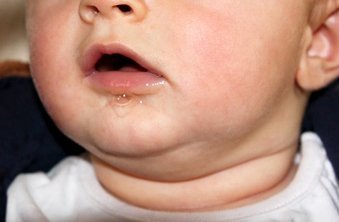
A baby’s first teeth usually appear around 6 months of age.
Some children get their first teeth as early as 4 months of age. Many parents get nervous after their baby’s first tooth appears. For the sake of our children's oral health, we will always make sure we brush their teeth diligently.
However, to ensure the healthy teeth of your child, good baby oral care should be started even before the first teeth appear. How can you start dental care even though your baby doesn’t have any teeth?
Today, we will learn about baby oral care that should be started from the newborn period.
3 Oral Care Tips for Babies Without Teeth
1. Until the first teeth appear, wipe your baby’s gums with a gauze handkerchief.
Baby teeth are clustered under the baby's gums. They have not yet come out of the gums, so they remain invisible to the naked eye.
This is because if you stimulate your baby’s gums, your baby's teeth can erupt up healthily.
From the newborn period, wipe your baby's mouth with a gauze handkerchief or wet gauze.
When your baby drinks breast milk or formula, milk residue remains on their lips and gums. With the intention of wiping off the debris, the child's tongue, and the inside of the cheeks will also be rubbed. Gently wipe between the upper lip and gums as well.
Tip: If you brush your child's mouth from time to time from an early age, they will accept brushing without hesitation even after their first tooth emerges. By all means, pay attention to your baby’s oral care from their newborn age!
2. Do not kiss a newborn baby or share a spoon.
Caries are a dental condition caused by bacteria in the mouth (bacillus mutans).
There is no mutans in the mouth of a newborn baby.
However, when a parent with tooth decay kisses a child's mouth, tooth decay bacteria can be transmitted through saliva. According to the results of one study, about 90% of tooth decay bacteria in children 19 to 33 months old were transmitted from the mother.
In addition to kissing, tooth decay is transmitted when parental saliva enters the child's mouth. Be careful not to spit when using the same spoon used by adults on your child, avoid sharing side dishes that you have already bitten, and avoiding blowing on your child’s food to cool it before you feed them.

3. Help your baby to not fall asleep while biting the milk bottle.
'Milk bottle caries (infantile caries)' refers to rapidly progressing cavities in the four upper incisors of children under the age of 2 years.
If your baby has a habit of sleeping with a bottle or mother's milk in their mouth, it is easy to develop bottle caries.
When the baby sleeps, the secretion of saliva decreases and the self-cleaning effect of saliva (the action of cleaning the mouth itself) decreases. Therefore, bacteria multiply in the accumulated breast milk or formula, which easily causes tooth decay.
The characteristic feature of caries in infancy is that white bands appear on the gums of the front teeth, and the teeth decay quickly. To prevent caries in infancy, it is better not to let your baby get into the habit of biting a bottle and sleeping.
After breastfeeding or formula feeding, be sure to wipe the baby's mouth with a clean handkerchief. Keeping an 'eat-play-sleep' routine is also important for your baby's dental health.
Parenting advice from Dr. Woo-Ram Han
Whether you are breastfeeding or formula feeding, caries management is essential.
Breastfeeding is recommended until 1 year of age.
However, the perception that breast milk does not cause dental caries may lead to less oral care than formula-fed infants.
No matter which type of milk your baby eats, make sure no milk or formula remains in their mouth for long periods of time.
To do this, you need to gradually reduce the amount of breastfeeding done during the night.
Newborns need feeding every 2-3 hours, but the intervals between feedings should increase over time. After 7-8 months, reduce night feeding and start training your baby using cups.
After the first tooth erupts, avoid falling asleep while breastfeeding and start weaning your child at an appropriate time. If you are bottle feeding sugary drinks at night, we recommend replacing them with water gradually. This is the time when the taste buds are formed, so try to postpone giving your baby the stimulant taste of sweetness for as long as possible.
---------------------------------------------------
Author: Dentist Han Woo-ram
- CEO of 'Seoul Hans Smile Dental Clinic' at Giheung Station, Yongin
- Graduated from Seoul National University College of Dentistry







